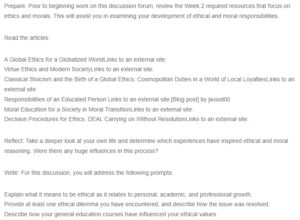Ethics and Moral Development Discussion
Academic and professional growth only emerges after a period of time. As individuals advance through the stages, they require a high sense of ethical standing. Being ethical means that there are basic principles that an individual must uphold to grow professionally, academically, and personally, including normative ethics. Normative ethics require one to uphold responsibility for them to achieve personal and career growth (Gong, 2010). To that end, they must differentiate between wrong and right. Do you need any help for completing your assignment ? Contact us at eminencepapers.com. We endeavor to provide you with excellent service.
One of the positive outcomes of being ethical and morally upright is that it builds one’s reputation. Colleagues and leaders observe how one carries themselves at the workplace, and if they act ethically, they create a good impression that positively contributes to personal, academic, and professional growth (Gong, 2010). Ethical behavior also bolsters emotional security. By letting others know they can rely on someone on a personal level, new growth opportunities will emerge and contribute to a sense of emotional wellness (Gong, 2010). Besides, being ethical builds teamwork spirit since members know they can rely on each other. In the long run, ethical behavior enhances performance in one’s academic and career prospects, leading to general personal growth.
Ethical dilemmas are common, and I have encountered such dilemmas a few times. One notable instance when I dealt with ethical dilemmas was when I was the captain of a football school team. The best-attacking trio in the football team missed the previous two training sessions. Applying the code of ethics to the letter meant the trio would miss a subsequent key match in our schedule. On the other hand, a failure to punish the trio would send a bad signal to the rest of the team, who may decide that obeying such rules is unnecessary. To solve the dilemma, we held a meeting as a team and came up with a consensus that they would play the significant match but get double suspensions for subsequent matches.
Education is an important contributor to building ethical values. It gives an individual a means to make a living and live a good life without relying on underhand methods (Bhargava, 2006). Besides, education offers one a chance to discover hidden talents and abilities. Consequently, these capabilities help an individual take responsibility for all life aspects (Bhargava, 2006). To that end, education has helped me differentiate right and wrong.
References
Bhargava, V. K. (Ed.). (2006). Global issues for global citizens: An introduction to key development challenges. World Bank Publications.
Gong, Q. (2010). Virtue ethics and modern society—A response to the thesis of the modern predicament of virtue ethics. Frontiers of Philosophy in China, 5(2), 255–265. https://doi.org/10.1007/s11466-010-0014-5.
ORDER A PLAGIARISM-FREE PAPER HERE
We’ll write everything from scratch
Question
Prepare: Prior to beginning work on this discussion forum, review the Week 2 required resources that focus on ethics and morals. This will assist you in examining your development of ethical and moral responsibilities.

Ethics and Moral Development Discussion
Read the articles:
A Global Ethics for a Globalized WorldLinks to an external site.
Virtue Ethics and Modern SocietyLinks to an external site.
Classical Stoicism and the Birth of a Global Ethics: Cosmopolitan Duties in a World of Local LoyaltiesLinks to an external site.
Responsibilities of an Educated Person Links to an external site.[Blog post] by jwood00
Moral Education for a Society in Moral TransitionLinks to an external site.
Decision Procedures for Ethics: DEAL Carrying on Without ResolutionLinks to an external site.
Reflect: Take a deeper look at your own life and determine which experiences have inspired ethical and moral reasoning. Were there any huge influences in this process?
Write: For this discussion, you will address the following prompts:
Explain what it means to be ethical as it relates to personal, academic, and professional growth.
Provide at least one ethical dilemma you have encountered, and describe how the issue was resolved.
Describe how your general education courses have influenced your ethical values.

